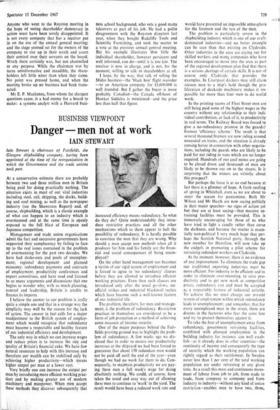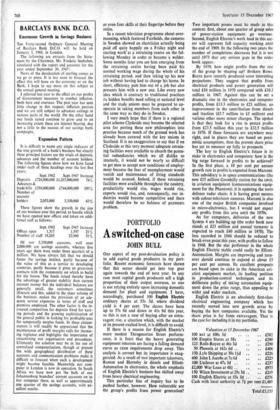Danger — men not at work
BUSINESS VIEWPOINT IAIN STEWART
lain Stewart is chairman of Fairfields, the Glasgow shipbuilding company, having been appointed at the time of the reorganisation in which the Government and the trade unions took part.
At a conservative estimate there are probably between two and three million men in Britain being paid for doing practically nothing. The situation exists in most of our vital industries including steel, rail, shipping, the docks, build- ing and coal mining, as well as the newspaper industry (see the Shawcross Report) and, of course, shipbuilding, which is a classic example of what can happen to an industry which is overmanned and at the same time is openly exposed to the full blast of European and Japanese competition.
Management and trade union organisations admit the fact and successive governments have supported their complacency by failing to face up to the real issues contained in the problem of overmanning for the past two decades. We have had shake-outs and pools of unemploy- thent; regional development and planned economy; redundancy payments and contracts of 'employment; productivity conferences and export committees, and have read and listened to so many arguments and discussions that one begins to wonder why, with so much planning, control and leadership, Britain is unable to finance its imports.
I believe the answer to our problem is really quite a simple one and that in a strange way the simplicity may well be the reason for the lack of action. The answer in fact calls for a major readjustment to the British system of employ- ' went which would recognise that redundancy must become a respectable and healthy feature of our industrial efficiency and development. The only way in which we can increase wages and reduce prices is to increase the size and 'quality of Britain's financial cake. We have few natural resources to help with this increase and therefore our wealth can be stabilised only by aChieving higher productivity—which means higher output per man at a lower cost. • Very briefly one can increase the output per man by introducing more efficient working prac- ticei and by making greater use of modern machinery and manpower. When men. accept these methods they discover subSequently that increased efficiency means redundancy. So what do they do? Quite understandably they intro- duce restrictive practices and all the other mechanisms which to them appear to halt the possibility of redundancy. It is hardly possible to convince the men that they are wrong. Why should a man accept new methods when all it produces for him and his family are the finan- cial and social consequences of being unem- ployed?
On the other hand management too becomes a victim of our rigid system of employment and is forced to agree to 'no redundancy' clauses before they are allowed to introduce efficient working practices. Even then such clauses are introduced only after the usual go-slows, un- official strikes and industrial blackmail tactics which have become such a well-known feature of our industrial life.
The problem, therefore, for men and manage- ment, is the problem of redundancy. Restrictive practices in themselves are considered to be a form of job protection or a method of achieving some measure of income security.
One of the major purposes behind the Fair- fields proving ground was to highlight the prob- lem of. redundancy. A few weeks ago we dis- closed that in order to ensure our productivity increases at the shipyard we had been forced to guarantee that about 150 redundant men would not be paid off until the end of the year—even though we-had na work for them to do. Con- sequently, to maintain productivity we are pay- ing these men a full week's wage for doing absolutely nothing. _We could, of course, have taken the usual and easy way out of allowing these men to continue to `work' in the yard. The result would have been a reduced work rate and would have presented an impossible atmosphere for the foremen and the rest of the men.
The problem is particularly severe in the . shipbuilding industry which is one of our craft- dominated industries—and no better example can be seen than that existing on Clydeside.
Other industries in the area are crying out for skilled workers and many companies who have
been encouraged to move into the area as part
of the regional development plan find that there is a serious shortage of certain skills. It is not of course only Clydeside that provides the examples. In Liverpool dockers may still claim sixteen men to a ship's hold though the pro- liferation of dockside machinery makes it im- possible for more than four men to do useful work.
In the printing rooms of Fleet Street men are still being paid some of the highest wages in the country without any relationship to their indi- vidual contribution, or lack of it, to productivity in real terms. The Railway Board was forced to give a no-redundancy promise in the guards/ firemen 'efficiency scheme.' The result is that several thousand firemen are now riding around unneeded on trains, and the situation is already causing havoc in connection with other negotia- tions, including the guards who are likely to be paid for not riding in vans which are no longer required. Hundreds of our coal mines are going to be closed down and thousands of men are likely to be thrown out on to the streets. Is it surprising that the miners are vitriolic about this prospect?
But perhaps the farce is at an end because at last there is a glimmer of hope. A fresh rustling of spring in Whitehall, even as we are about to enter the season for pantomime. Both Mr Wilson and Mr Heath are now saying publicly in their major speeches—no signs of action yet but they are at least saying—that massive re- training facilities must be provided. This is immensely encouraging for those of us who have tried to light a candle rather than curse the darkness, and because the matter is essen- tially non-political I very much hope that per- haps the Scottish National party, through the new member for Hamilton, will now take up the cudgels in promoting a pilot scheme for retraining redundant workers on Clydeside.
At the moment, however, there is no evidence of any improvement. To eliminate the trade gap our traditional exporting industries must be more efficient. For industry to be efficient and in order to eliminate over-manning, to raise pro- ductivity and to get new work at competitive prices, redundancy can and must be accepted as a respectable feature of industrial activity. To achieve this we must change our present system of employment within which redundancy leads to unemployment; and remember, that for every unemployed man in the street, there are dozens in the factories who fear the same fate and try to protect themselves against it.
To take the fear of unemployment away from redundancy, government retraining facilities, combined with planned employment in the building industry for instance, can well estab- lish—as it already does in other countries—the continuity of income and consequently the type of security which the working population can rightly regard as their entitlement. In Sweden never less than 1 per cent of the total working population are under retraining at any given time. As a result this mass and continuous move- ment of labour from job to job, from trade to trade, from company to company and from industry to industry—without any kind of union restriction—enables men to have two, three,
or even four skills at their fingertips before they retire.
In a recent television programme about over- manning, which featured Fairfields, the cameras in Sweden showed an electrician actually being paid off quite happily on a Friday night and starting work' at a retraining centre on the fol- lowing Monday in order to become a welder. Some months later you see him emerging from the retraining centre having been paid his normal working wage during the whole of his retraining period, and then taking up his new job without having had to change his home. In short, efficiency puts him out of a job but also presents him with a new one. Like every new idea which is contrary to traditional practices its hidden benefits need selling at national level and the trade unions must be prepared to co- operate in taking members from each other in the same way as they do in Sweden.
I very much hope that if there is a regional pilot scheme Clydeside may become the selected area for putting these new philosophies into practice because much of the ground work has already been covered with the key unions in Scotland. It is no exaggeration to say that if on Clydeside at this very moment adequate retrain- ing facilities were available to absorb the poten- tial redundancies which we all dislike so intensely, it would not be nearly so difficult to get men to accept new conditions of employ- ment because the fear of unemployment would vanish and maintenance of living standards would be assured. Indeed, if these retraining facilities were available throughout the country, productivity would rise, wages would rise, exports would rise, and, consequently, our in- dustries would become competitive and there would therefore be no balance of payments problem.



































 Previous page
Previous page